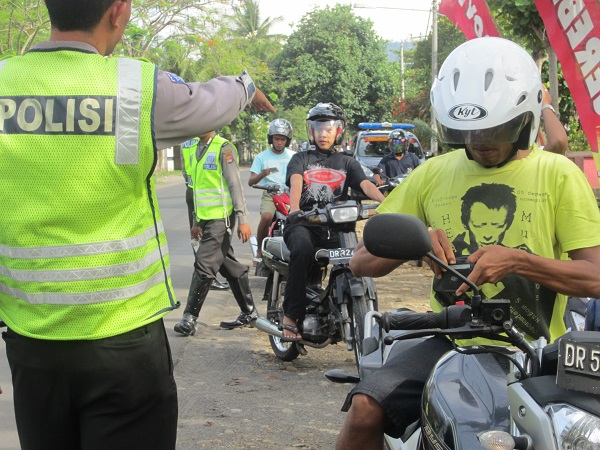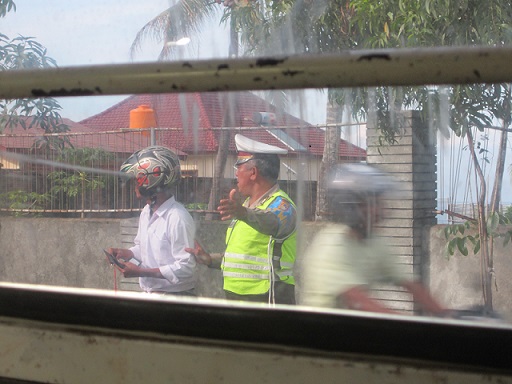How can you be a straight cop when people just give you money?
Sharyn Graham Davies, Adrianus Meliala and John Buttle
A police officer kindly guiding a motorist back to his bike after a licence check Sharyn Graham Davies
Early each morning in a small town on an island in Indonesia, anywhere from two to eight police officers gather in front of a small convenience store. They are kitted-out in thick uniforms, but they show no signs of sweat or discomfort, even when the humid heat reaches the high thirties. Each keeping their gun, if they have one, holstered, the officers sit casually on benches in the shade. They drink coffee, eat noodles, and smoke. While the store is a convenient place for these activities, arguably of greater importance is the fact that it is a prime location to spot traffic infringements.
The police are here from eight to 10am every morning: peak hours. There is no pattern to their activities once here, however. These regulars might spend the morning chatting and nothing more. Other times they might stand on the side of the road and pull commuters over. The police check that motorbike drivers (though not passengers) are wearing a helmet. There seems to be no regulation beyond having some kind of plastic hat on your head. Straps are often undone or non-existent and some helmets look like children’s toys. One helmet has been in such a bad accident that someone has stitched the three plastic fragments back together.
There is no limit on the number of people on a motorbike. It is not uncommon to see a family of five huddled together. Driver licence and registration papers are checked. For cars, seatbelts are checked too,,although only the driver is required by law to wear one. Many cars in Indonesia are built without rear seatbelts. Any infringement results in a fine, but there is little official paperwork.
One of these officers, let’s call him Gus, is over six feet tall. His trousers stop well above the ankles – police-issued uniforms seem not to cater to this length. His holster holds an old-style cowboy-type gun. On this particular morning at around 9am, he stops a man riding a nice motorcycle. Let’s call this man Ari. Ari presents the officer with his registration paper and licence, the latter being one of the new electronic cards rather than the older paper licence. The card, however, is completely defaced. Nothing can be discerned except for a “B” in the top right corner. The officer looks disgruntled. Ari pulls out what he says is a photocopy of his driver’s licence. The officer holds them up next to each other to compare. The only thing they have in common is the B in the top right corner – nothing else is visible on the card.
The officer is not satisfied. He pulls out his cell phone and calls, presumably, headquarters. No one answers. He calls again, and again. After about 10 minutes he gets through. Gus then tells Ari he really needs to see the original licence, not a copy or a defaced one. There is another problem: the number on the registration paper does not match that on the motorcycle’s plate. Ari responds, ‘Oh actually, I do have the original. I can get it. It is just over there in that building.’ The officer tells Ari to go and get it.
After waiting about five minutes the officer jumps up from the bench. He walks swiftly across the road. He stands in front of the building for a few minutes, and then goes inside. He is inside for about 10 minutes. Almost 30 minutes have now passed since Ari was pulled over. Eventually they both come out of the building and cross the road. Ari mounts his bike and rides off.
When Gus comes back to the gathering at the convenience store an informal traffic controller, a man in his early thirties, starts playfully to pat the officer down. The controller searches the officer’s pockets and runs his hands up and down his limbs. Someone else joins in. Everyone is laughing, including at first Gus. Then Gus starts getting annoyed. He tries to push the traffic controller away, saying, ‘what is this, are you the mafia?’ Finally the controller pulls a packet of cigarettes out of the officer’s trouser pocket. But on finding there is only one cigarette, he violently throws the packet away. The traffic controller, now quite angry, walks back into the middle of the road to direct traffic. Gus adjusts his holster, straightens his trousers, saunters across the road, mounts his bike, and rides off.
 Police conducting licence checks Sharyn Graham Davies
Police conducting licence checks Sharyn Graham Davies
Whose problem?
So what happened here? Ari was randomly pulled over by during a regular police traffic stop. He knew he did not have proper documentation and that he would have to pay either the police officer or the court. He also knew that openly bribing the officer, especially in front of the traffic controller, would create trouble. Given his options, Ari audaciously proclaimed that his real licence and registration just happened to be in a random building on the other side of the road.
The officer knew that if money were passed on the spot he would have to pay the traffic controller a cut. He waited a sufficient amount of time to give the impression that it suddenly occurred to him the suspect may have done a runner. The transaction was then carried out in private. The officer put the money in his boot, or holster, or somewhere else the traffic controller would not search.
A formal traffic fine is usually around Rp.45,000 (about A$5) and requires the offender to attend court. Ari probably happily paid Gus Rp.50,000 to make the problem go away. When the officer returned, no one had any doubts he had been paid a bribe, hence the traffic controller patted him down and checked his pockets.
What can we learn about public-police relations from this scenario? Probably three things: public influence; money-motivated policing; and police-public complicity. First, lets look at how the public influences the police. When Ari was stopped by the officer, his demeanour showed no sign of apprehension. On the contrary, Ari confidently pulled out a defaced licence and a fake photocopy. When this failed to appease the officer, Ari boldly asserted that his original licence was in a neighbouring building.
Nothing in Ari’s actions or words suggested anxiety or fear of the police. Ari knew he was breaking the law, but he was confident he could get away with it through bribery. The subsequent jostling and body-search of the officer only confirmed society’s lack of respect for police. Despite the officer appearing to give the orders and obtaining money, it looked like Ari was in control of the transaction.
Second, this scene suggests police are primarily concerned with making money. A likely reason that Ari was pulled over in the first place was that he was smartly dressed and drove a late-model motorbike. Even though Ari had an invalid licence and registration, no further check was carried out. What if the motorbike had been stolen? Ari was not compelled at any point to go and get a valid licence and registration. The law, and the public it should be protecting, seem to be of little concern to police in this instance.
Finally, the scenario indicates that the police and the traffic offenders they pull over are in this together. There were many levels of wrongful behaviour: Ari driving unlicensed; the police officer accepting a bribe; the disrespectful harassment of the officer by the traffic controller and other police. Indeed, we see how hard it is to be a straight cop when, in this instance, Gus was offered literally half a day’s wage for taking no further action. Yet, no one reported any of these incidents to a higher authority. Of course, reporting such incidents poses the problem of to whom should one report, what would the expected outcome be, and what kind of ill-treatment might the whistle-blower face? What this scenario shows is that reforming the police service is an uphill battle.
*During her ethnographic fieldwork in Indonesia, Sharyn spent many mornings hanging out with police officers during their morning patrol. This scene is taken from events that occurred on one such morning.
Sharyn Graham Davies (sharyn.davies@aut.ac.nz) is Associate Professor in the Department of Social Sciences at Auckland University of Technology (AUT).
John Buttle (john.buttle@aut.ac.nz) is Senior Lecture in the Department of Social Sciences at Auckland University of Technology (AUT).
Adrianus Meliala (adrianus.meliala@ui.ac.id) is Professor of Criminology at the University of Indonesia and has recently been appointed a Commissioner of Police Complaints.












